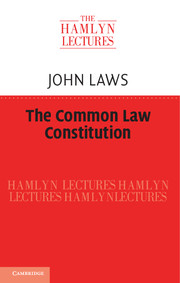Lecture II - The Common Law and Extremism
Published online by Cambridge University Press: 05 August 2014
Summary
In Lecture I, I described the constitutional balance between law and government, between the judicial and political arms of the state. The constitutional balance involves a compromise between the immediacy of political will and the gradual processes of the common law. It works in practice through the medium of three truths: (1) judicial interpretation is evaluative, not merely grammatical; (2) the common law is gradual, but legislation is immediate; (3) interpretation and the elaboration of principle are indissoluble. By means of the constitutional balance statute law and government policy are both delivered to the people through the prism of reason, fairness and the presumption of liberty, and the legislature is allowed efficacy but forbidden oppression. The result is our possession of a great political gift, the harmony of freedom and justice, and therefore the tranquillity of the state.
However, I identified two contemporary threats to the constitutional balance. The first, the subject of this Lecture, is that present-day fears, real and imagined, of the grip of extremism exert an unwanted, perhaps dangerous, pressure on the moderate liberality of the common law. This threat, and the threat I shall describe in Lecture III, are examples of the challenge which the common law constitution will always face, a challenge born of its very openness. Because our law is constantly renewed by the force of fresh examples; because it reflects and moderates the temper of the people as age succeeds age; because it builds on the experience of ordinary struggles, its principles, and therefore the constitutional balance, will always be buffeted by events. In difficult times the legislature and the executive will press hard upon the common law’s moderating force in the search for political solutions. And there will be places and times when that moderating force will have to give ground. The challenge is to keep the constitutional balance.
- Type
- Chapter
- Information
- The Common Law Constitution , pp. 31 - 56Publisher: Cambridge University PressPrint publication year: 2014



